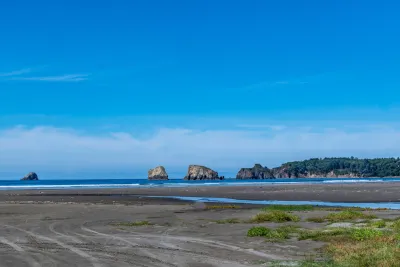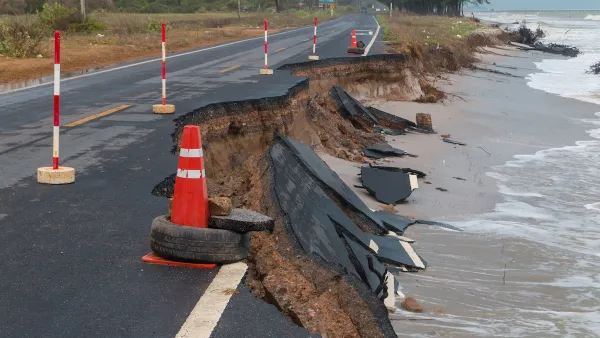Tribal communities threatened by climate change are opting to relocate or engage in ‘managed retreat’ to save their villages from sea level rise, erosion, flooding, and other climate impacts.

Eleven tribal communities have received federal relocation grants to help them move to safety to avoid the impacts of climate change, reports Kristi Eaton in the Daily Yonder.
The grants, which are worth $5 million each, are earmarked for communities facing significant and widely varied climate risks, including coastal and riverine erosion, permafrost degradation, wildfire, flooding, food insecurity, sea level rise, hurricane impacts, potential levee failure, and drought.
The grants are funded through the Bipartisan Infrastructure Law, “which provides a total of $466 million to the Bureau of Indian Affairs (BIA) over five years, including $216 million for climate resilience programs,” Eaton explains. “The Inflation Reduction Act provides BIA with an additional $220 million for climate adaptation and resilience, of which the Department anticipates spending $40 million to support voluntary community-driven relocation efforts, with the remainder supporting broader Tribal climate resilience activities.”
The Alaskan village of Newtok, one of the grant recipients, “decided to relocate in 1994 after a decade of trying to address the community’s erosion threat by other means of mitigation.” Another Alaskan village, Napakiak, “is conducting a managed retreat, which is different from a relocation,” in that threatened homes are moved to nearby locations adjacent to the current community. The grants aim to help communities figure out their best action plan for mitigating climate impacts and relocating when necessary.
FULL STORY: Tribal Nations Receive Relocation Grants to Escape the Effects of Climate Change

Analysis: Cybertruck Fatality Rate Far Exceeds That of Ford Pinto
The Tesla Cybertruck was recalled seven times last year.

National Parks Layoffs Will Cause Communities to Lose Billions
Thousands of essential park workers were laid off this week, just before the busy spring break season.

Retro-silient?: America’s First “Eco-burb,” The Woodlands Turns 50
A master-planned community north of Houston offers lessons on green infrastructure and resilient design, but falls short of its founder’s lofty affordability and walkability goals.

Test News Post 1
This is a summary

Analysis: Cybertruck Fatality Rate Far Exceeds That of Ford Pinto
The Tesla Cybertruck was recalled seven times last year.

Test News Headline 46
Test for the image on the front page.
Urban Design for Planners 1: Software Tools
This six-course series explores essential urban design concepts using open source software and equips planners with the tools they need to participate fully in the urban design process.
Planning for Universal Design
Learn the tools for implementing Universal Design in planning regulations.
EMC Planning Group, Inc.
Planetizen
Planetizen
Mpact (formerly Rail~Volution)
Great Falls Development Authority, Inc.
HUDs Office of Policy Development and Research
NYU Wagner Graduate School of Public Service




























